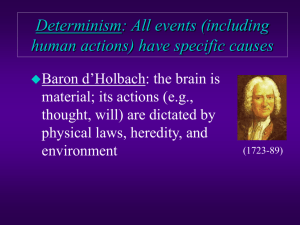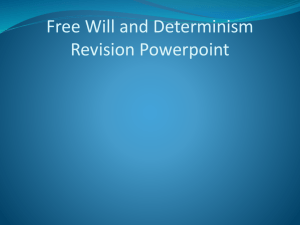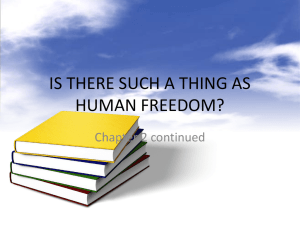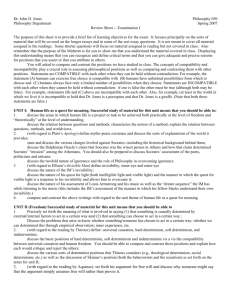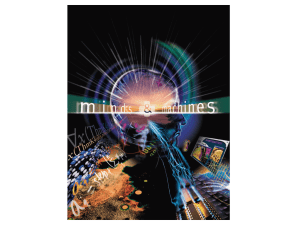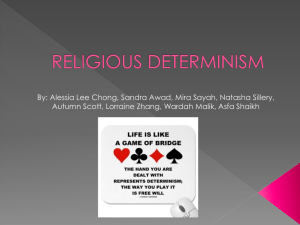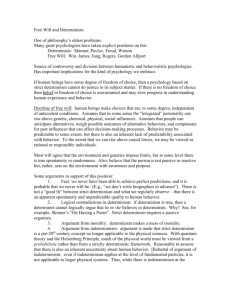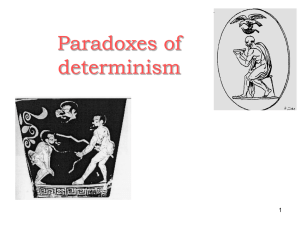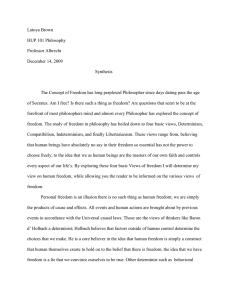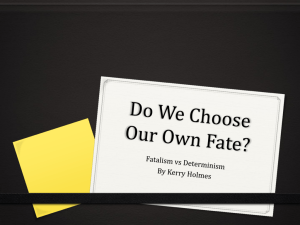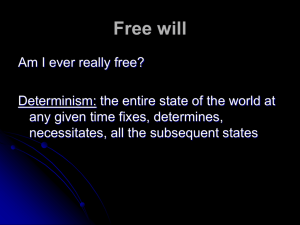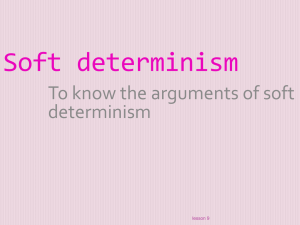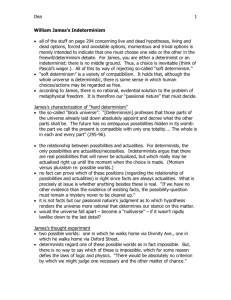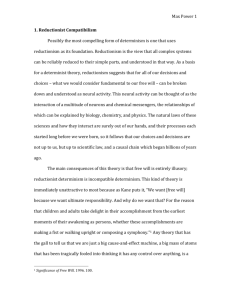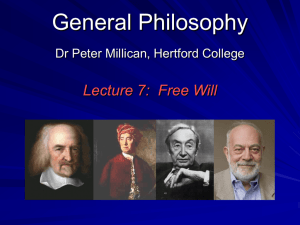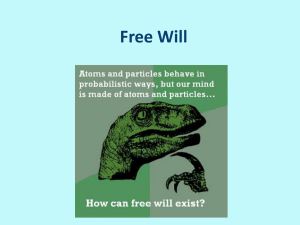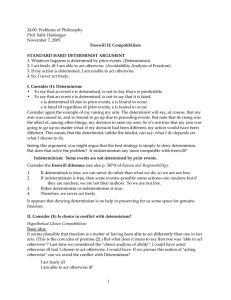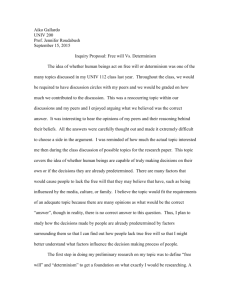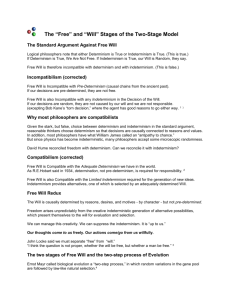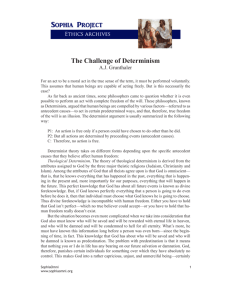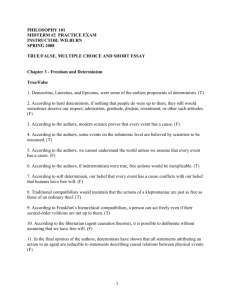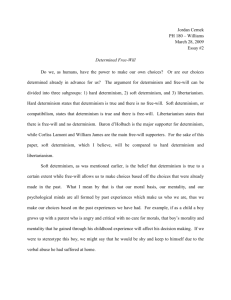Ch 6 Freedom Quiz
advertisement
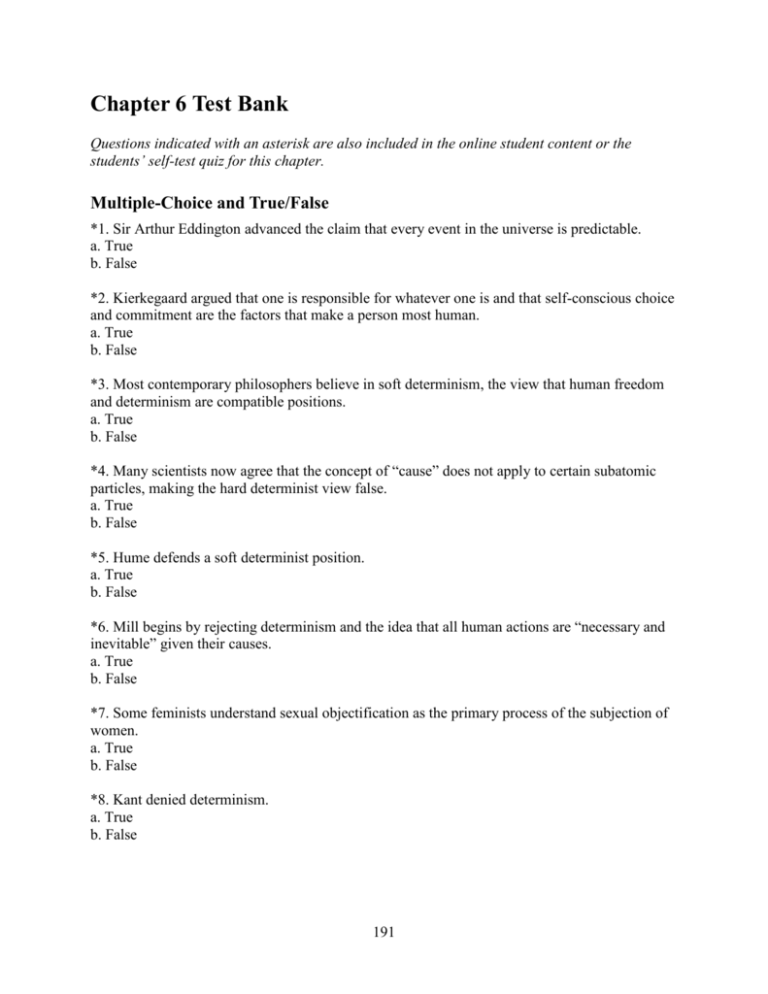
Chapter 6 Test Bank Questions indicated with an asterisk are also included in the online student content or the students’ self-test quiz for this chapter. Multiple-Choice and True/False *1. Sir Arthur Eddington advanced the claim that every event in the universe is predictable. a. True b. False *2. Kierkegaard argued that one is responsible for whatever one is and that self-conscious choice and commitment are the factors that make a person most human. a. True b. False *3. Most contemporary philosophers believe in soft determinism, the view that human freedom and determinism are compatible positions. a. True b. False *4. Many scientists now agree that the concept of “cause” does not apply to certain subatomic particles, making the hard determinist view false. a. True b. False *5. Hume defends a soft determinist position. a. True b. False *6. Mill begins by rejecting determinism and the idea that all human actions are “necessary and inevitable” given their causes. a. True b. False *7. Some feminists understand sexual objectification as the primary process of the subjection of women. a. True b. False *8. Kant denied determinism. a. True b. False 191 Instructor’s Test Bank – Chapter 6 *9. Fatalism is the view that whatever a person’s actions and circumstances, his or her predetermined end is inevitable. a. True b. False *10. Hume argued for compatibilism. a. True b. False *11. Soft determinism is also known as __________. a. indeterminism b. compatibilism c. fatalism d. free will e. Hume’s dilemma *12. The view of many theologians that our every action is known by God is called __________. a. theism b. omniscience c. the free choice of the will d. voluntarism e. predestination *13. Determinism is the thesis that every event has its __________ causes. a. irrelevant b. sufficient c. determined d. free e. mental *14. Sartre is a radical __________. a. libertarian b. feminist c. determinist d. totalitarian e. dude *15. Frankfurt rethinks the meaning of coercion in terms of the experience of __________. a. society b. Marx c. Hume d. the agent e. totalitarianism 192 Instructor’s Test Bank – Chapter 6 16. What is assumed when we hold people accountable for their actions? a. free will b. karma c. universal law d. nihilism 17. Is it possible to have free will but not freedom? a. No, there’s always a way to do what you will. So, as long as you have a free will, you have freedom. b. No, it’s not possible to have either. Both are illusions. c. Yes, you could be constrained and unable to exercise your free will. d. Yes, you are always free in your mind, even though there is no freedom in the physical, deterministic universe. 18. In the ancient Greek tragedy, Oedipus the King, Oedipus and Iocasta behave in a way that exemplifies the concept of __________. a. karma b. fate c. determinism d. compatibilism 19. The Western concept of “nihilism” is similar to the Eastern concept of “nothingness.” a. True b. False 20. Kierkegaard called karma the sickness unto death. a. True b. False 21. Predestination depends on particular antecedent conditions. a. True b. False 22. Hard determinism depends on particular antecedent conditions. a. True b. False 23. Fatalism depends on particular antecedent conditions. a. True b. False 24. Prayer in Islam is the ego’s escape from mechanism to freedom. a. True b. False 193 Instructor’s Test Bank – Chapter 6 25. Why did God give free will to people if He knew that people would use it to sin, according to St. Augustine? a. because God hoped they wouldn’t b. because God is not all-knowing and did not anticipate that outcome c. because God is not all-powerful and couldn’t prevent people from sinning d. because justice, punishment and reward, is one of the goods that is from God 26. According to the Yoruba philosophy, what determines a person’s fate? a. one’s self (free will of the soul) b. God c. ori d. karma 27. Jacobus Arminius argued that just because God has foreknowledge of our actions, that doesn’t mean that humans don’t act freely. a. True b. False 28. What name does Dennett give to the notion that we are automata without free will and at the mercy of brute causation? a. zomboid b. mechanoid c. mechanish d. sphexish 29. The model of determinism can be put this way: To say that every event has its cause is to say that if certain antecedent conditions are satisfied, then we can predict that such and such will occur. a. True b. False 30. The model of indeterminacy can be put this way: Not every event has its sufficient natural cause. a. True b. False 31. Indeterminacy guarantees free will. a. True b. False 32. According to the Heisenberg Uncertainty Principle, if you know the location of a subatomic particle, then you __________. a. also know the momentum of it b. can’t know the momentum of it c. also know the size of it d. can’t know the size of it 194 Instructor’s Test Bank – Chapter 6 33. Quantum theory asserts the indeterminacy of __________ particles. a. macroscopic b. electromagnetic c. subatomic d. gravitational 34. When a drug addict wants to have his or her drug of choice but at the same time wants to quit, he or she has a conflict of first-order desires. If the addict desires to have only the desire to quit, this desire is called __________, according to Frankfurt. a. second-order b. abstinence c. third-order d. self-forming choice 35. B. F. Skinner’s method of controlling animal and human behavior and changing it for the better through conditioning is based on a belief in __________. a. coercion b. divine intervention c. indeterminism d. determinism Discussion/Essay *36. Compare and contrast hard determinism, soft determinism, and indeterminism. Explain why indeterminism is just as problematic as hard determinism. From what two traditions of physics do these views arise? *37. Compare and contrast fatalism and karma. Which view makes the most sense? *38. Explain the concept of predestination. What is the Islamic conception of predestination? Contrast this view to the Western religious view. *39. Write a debate between Sartre and Frankfurt on the existence of freedom. *40. Argue for the position that freedom means simply “not constrained.” Can this position be reconciled with the idea that freedom means “could have done otherwise”? Why or why not? 41. Would you rather be a gear in a big deterministic machine or some random swerving probabilistic atomic particle in an indeterministic system? If every action (including yours) in the universe is determined, then you don’t have freedom. If every action (including yours) in the universe is random, then you don’t have freedom. If every action (including yours) is a percentage of each, then you don’t have freedom. Is there another alternative that can save your freedom? 195 Instructor’s Test Bank – Chapter 6 42. Does it make sense to praise or blame someone for something that person had no control over? If she couldn’t do otherwise, would there be any justification for accolades or punishment? Discuss the correlation between moral responsibility and free will. 43. How are fatalism, hard determinism, and predestination different? Common street lingo may use these terms synonymously; however, there are important distinctions for the philosopher. What are they? 44. Discuss Dennett’s insight that whenever philosophers or laypeople worry about whether or not we have free will, they mount illicit arguments (straw man fallacies) that some rival agent is involved. They then show how ludicrous it would be to assume that a rival agent is vying for control of our bodies and minds, thereby taking away our free will (or preventing us from having it in the first place). However, without these “bogymen,” as Dennett puts it, to anchor the philosophical discussions, the idea of a natural lack of free will would not be so strange. Why does Dennett think agency confounds the discussion? 45. Consider Robert Kane’s notion of “self-forming choices.” The idea is that we create our characters and dispositions by the ongoing choices we make, i.e., we create our selves. Discuss how this might come about in the physical sense, according to Kane. He suggests that there is a “stirring up of chaos in the brain that makes it sensitive to micro-indeterminacies at the neuronal level.” How would moments of self-formation actually alter neuronal processes? How might you go about designing an experiment to test this hypothesis? 46. Describe the difference between first-order and second-order desires. Use examples. Answer Key: Multiple-Choice and True/False, Chapter 6 1. b 2. a 3. a 4. a 5. a 6. b 7. a 8. b 9. a 10. a 11. b 12. e 13. b 14. a 15. d 16. a 17. c 18. b 19. a 20. b 21. b 22. a 23. b 24. a 196 25. d 26. c 27. a 28. d 29. a 30. a 31. b 32. b 33. c 34. a 35. d
